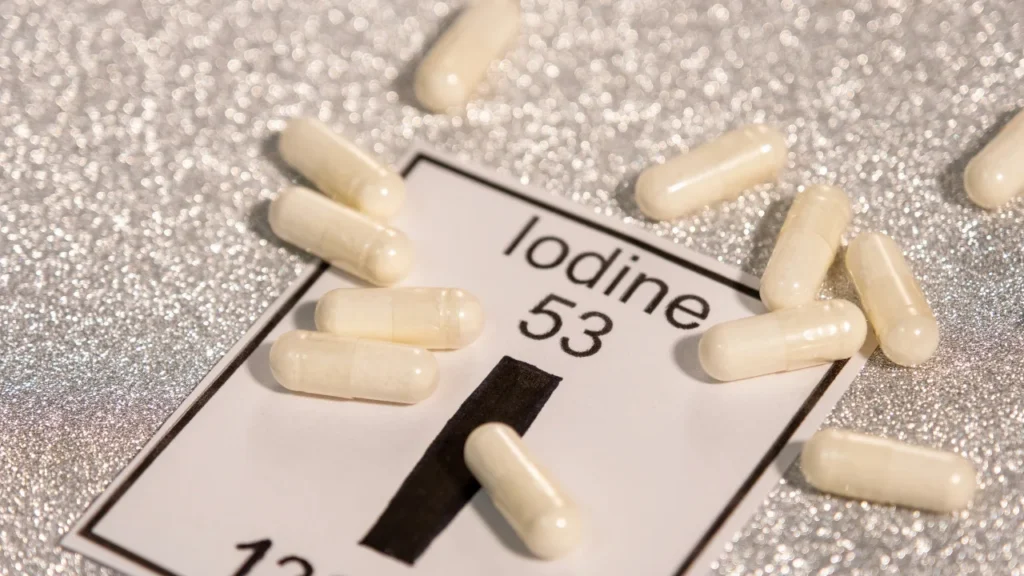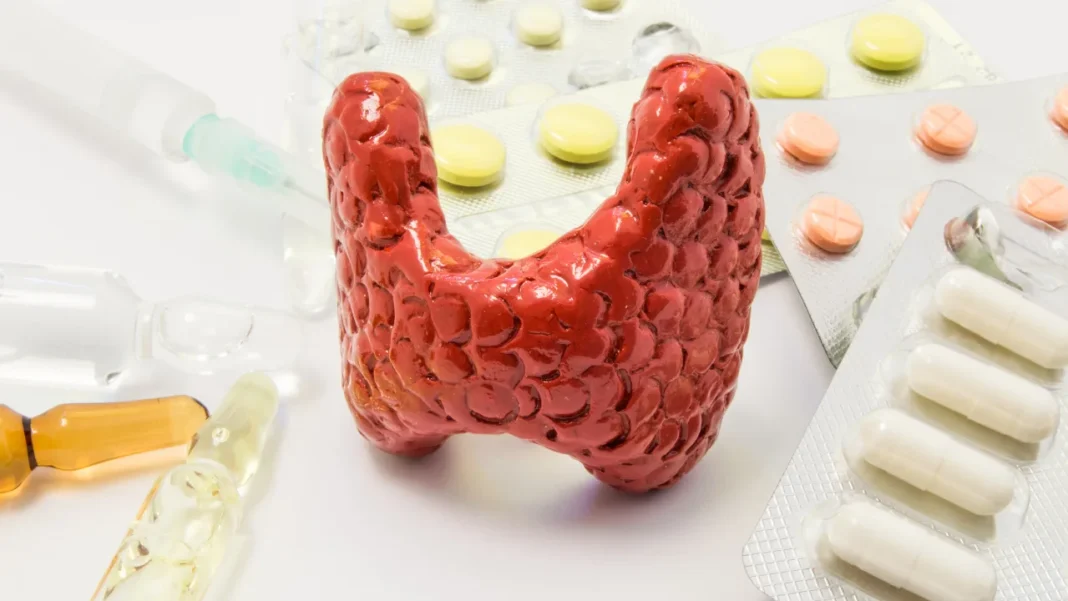Description
Hashimoto’s thyroiditis represents a chronic autoimmune disease that impacts the thyroid gland. It is sometimes referred to as autoimmune thyroiditis or chronic lymphocytic thyroiditis. It is named for Dr. Hakaru Hashimoto, who provided the initial description of it in 1912. This disorder, which is the most frequent reason for hypothyroidism (underactive thyroid), arises when the immune system inadvertently targets thyroid tissue, causing inflammation and eventual thyroid gland loss. Hormones necessary for controlling growth, metabolism, and other body processes are produced by the thyroid gland, which is located in the human neck.
When the immune system targets thyroid tissue, as in Hashimoto’s thyroiditis, the thyroid gland becomes inflamed and gradually damaged. Tiredness, increased weight, hair loss, susceptibility to cold and dry skin, muscular weakness, joint discomfort, depression, and irregular menstruation are just a few of the symptoms that can vary greatly and indicate Hashimoto’s thyroiditis. Certain genetic predispositions, radiation exposure, being a woman because it is more prevalent in women, and a family association with thyroid disorder are warning signs for this autoimmune disease.
You May Also Like:
Immune-mediated necrotizing myopathy (IMNM): Description, Causes, and Treatment Protocol
Hidradenitis suppurativa: Description, Causes, and Treatment Protocol
Hashimoto’s thyroiditis / chronic lymphocytic thyroiditis / autoimmune thyroiditis: Description, Causes, and Treatment Protocol is an original (MedNewsPedia) article.
Possible Causes
There exist intricate relationships between immunological, environmental, and genetic factors that contribute to Hashimoto’s thyroiditis. Although the precise cause is still unknown, several possible causes have been found:
Autoimmune Factors: Immunological cells in the body target the thyroid gland due to an abnormal immunological response, resulting in tissue damage and inflammation. Patients with Hashimoto’s thyroiditis frequently have increased levels of antibodies, like thyroid peroxidase antibodies (TPOAb) and thyroglobulin antibodies (TgAb).
Genetic Predisposition: Hashimoto’s thyroiditis is more common in people who have a family record of autoimmune disorders. Additionally, some genetic polymorphisms and variations may make people more susceptible to autoimmune thyroid disorders.
Environmental Triggers: Certain viral infections, including Epstein-Barr virus and other pathogens, have been suggested as potential triggers for autoimmune responses against the thyroid gland. Thyroid autoimmune illnesses have been linked to radiation exposure, whether from medical treatments or environmental sources.
Hormonal Factors: Compared to men, women are more likely to develop Hashimoto’s thyroiditis, which suggests that hormones, especially estrogen, may be involved. Hormonal changes before or after pregnancy might cause some women to acquire thyroid disorders, including Hashimoto’s disease.
Stress: Although it is not an immediate trigger, stress may lead to Hashimoto’s thyroiditis. Long-term stress can impair immunological function, promoting inflammation and perhaps starting or intensifying autoimmune reactions targeting the thyroid gland in those who are vulnerable, which can aid in the onset or worsening of the condition.
Iodine Intake: Although the association between excessive and insufficient iodine intake and Hashimoto’s thyroiditis is complex and poorly understood, both have been proposed as potential triggers.
Smoking: While it is not the direct cause, smoking is linked to a higher incidence of Hashimoto’s thyroiditis. In vulnerable individuals, the chemicals in cigarette smoke can cause inflammation and impair immunological function, which may lead to the onset or exacerbation of autoimmune reactions against the thyroid gland.

Exacerbating and Mitigating Factors
Several conditions can either aggravate or lessen the symptoms and course of Hashimoto’s thyroiditis. Effective management of the disorder requires an understanding of these factors. The following are factors that can aggravate or alleviate Hashimoto’s thyroiditis:
The exacerbating factors of Hashimoto’s thyroiditis involve:
Stress: Prolonged stress might affect the immune response and aggravate autoimmune reactions. The stress hormone cortisol can affect the synthesis and function of thyroid hormones.
Iodine Intake: For those who have Hashimoto’s thyroiditis, consuming too much iodine may occasionally make their thyroid inflammation worse. Iodine deficiency, on the contrary, can also be hazardous and needs to be treated with caution.
Poor Sleep Patterns: Inflammation and immunological function may be severely impacted by inadequate sleep or irregular sleep cycles.
Environmental Factors: Allergy reactions may be exacerbated or triggered by exposure to chemicals, pollutants, and environmental contaminants. Thyroid problems can be exacerbated by radiation exposure, but not as often.
Medications: There are specific medications that can make the illness worse, like immune suppressants or thyroid function-affecting pharmaceuticals. The autoimmune thyroid illness has been linked to worsening conditions like lithium and interferon-alpha.

The mitigating factors of Hashimoto’s thyroiditis involve:
Stress Management: Stress can be controlled by methods including yoga, mindfulness, meditation, and deep breathing techniques.
Balanced Diet: A diet rich in minerals, such as zinc, selenium, vitamin D, and enough iodine within prescribed limits, may help maintain thyroid function.
Lifestyle Modifications: Frequent exercise may help with symptom management and enhance general well-being. Thyroid function can be adversely affected by smoking and heavy alcohol intake, so these behaviors should be avoided.
Adequate Sleep: Overall immune health can be supported by adhering to a regular sleep pattern and making sure one gets enough sleep.
Environmental Awareness: To properly manage Hashimoto’s thyroiditis, environmental awareness helps prevent triggers and encourages lifestyle modifications.
Standard Treatment Protocol
The usual treatment strategy for Hashimoto’s thyroiditis focuses mostly on hormone replacement therapy, which aims at addressing the hormonal imbalance created by the autoimmune damage to the thyroid gland. The basic treatment options are outlined below:
Hormone Replacement Therapy: This comprises:
Levothyroxine (T4 Replacement)
Thyroxine (T4), a hormone that the thyroid gland usually generates, is also available in synthetic form as levothyroxine. The body uses it to compensate for the low amounts of thyroid hormone. A person’s unique thyroid hormone levels are often used to calculate the dosage, which is then gradually modified.
Liothyronine (T3 Replacement)
Another thyroid hormone called triiodothyronine (T3) is synthesized as liothyronine. When treating chronic symptoms or inadequate transformation of T4 to T3, it could occasionally be administered in addition to levothyroxine.
Consistent Observation and Adaptation: These include:
Regular Monitoring
To track thyroid hormonal levels and modify prescription dosages accordingly, patients usually receive routine blood tests.

Physician Consultations
This involves ensuring adequate treatment management through scheduled appointments with medical professionals to evaluate symptoms.
Additional Considerations: These involve:
Patient Education
Individuals are informed regarding the value of taking their medications as prescribed and about any possible interactions or negative effects.
Dietary Guidance
Thyroid function may be impacted by high or low iodine levels. People should be encouraged to have a balanced diet that includes a moderate amount of iodine.

Treatment Options
Numerous dietary supplements, lifestyle changes, herbal medicines, and natural remedies are available as adjunctive therapy for Hashimoto’s thyroiditis, and they may be helpful in symptom management and thyroid health support. For Hashimoto’s thyroiditis, these are some additional therapy choices:
Nutritional Supplements: The treatment of Hashimoto’s thyroiditis can be enhanced by nutritional supplements. Among these dietary supplements are a few of the following:
Vitamin D
Sufficient amounts of vitamin D may improve the immunological response and perhaps decrease autoimmune reactions.
Omega-3 Fatty Acids
The anti-inflammatory properties of omega-3 fatty acids are known to be present in fish oil. They may also help lower overall inflammation and decrease inflammatory responses in the body.
Selenium
According to studies, selenium supplementation can improve thyroid gland activity and minimize thyroid inflammation in some people.
Zinc
An important mineral, zinc, is involved in the generation of thyroid hormone and immunological function. Although further research is required, several studies indicate that taking zinc supplements may boost the immune system and thyroid health.

Iron
Thyroid hormone production and general metabolic processes depend on iron. If iron deficiency is present, treating it may be advantageous for thyroid function, particularly if it is causing hypothyroidism.
Lifestyle Modifications: These involve:
Balanced Diet
Thyroid function can be supported by a nutrient-rich diet that includes iodine in moderation. On the other hand, consuming too much iodine is not advisable.
Stress Management
Immune response modulation may be aided by stress-reduction methods like meditation, yoga, or mindfulness.
Herbal and Natural Remedies: The following herbal and natural therapies have been investigated for possible health advantages:
Adaptogenic Herbs
Herbs that enhance immune function and help regulate stress include rhodiola (Rhodiola rosea), holy basil (Ocimum tenuiflorum), and ashwagandha (Withania somnifera).
Makandi (Coleus forskohlii)
This Indian native plant has long been utilized for a variety of medicinal reasons in Ayurvedic medicine. According to certain research, the plant possesses an active ingredient called forskolin that may boost the production of thyroid hormone.
Turmeric (Curcumin)
Curcumin, which has anti-inflammatory and antioxidant qualities, is found in turmeric. By lowering oxidative stress and inflammation, curcumin may improve immunological response.
Bladderwrack (Fucus vesiculosus)
The high iodine concentration of bladderwrack is well recognized. Since iodine is necessary for the synthesis of thyroid hormones, supplementing may help promote thyroid function in iodine-deficient individuals. Historically, it has been utilized to promote thyroid health, particularly in cases of goiter and other thyroid problems associated with iodine shortage.
Licorice Root (Glycyrrhiza glabra)
Traditional uses for licorice root suggest that it may have anti-inflammatory qualities. Even though caution is advised due to possible negative effects with prolonged usage, it may help modify immunological reactions.
However, patients should speak with healthcare practitioners before beginning any adjunct treatment to ensure safety, effectiveness, and possible interactions with the currently used medications.
Conclusion
Hashimoto’s thyroiditis, or chronic lymphocytic thyroiditis, is a prevalent autoimmune condition with a multifaceted interplay of genetic, environmental, and hormonal factors. Its impact on thyroid function can lead to significant health challenges, requiring a tailored and comprehensive approach to management. The cornerstone of treatment is hormone replacement therapy, supported by lifestyle modifications, nutritional supplementation, and stress management. Adjunct therapies, such as herbal remedies and natural interventions, may provide additional support but should always be undertaken under medical supervision. A collaborative effort between patients and healthcare providers can optimize treatment outcomes, enhancing overall well-being and mitigating the impact of this chronic condition.

Additional resources for further reference
https://www.ncbi.nlm.nih.gov/books/NBK459262
https://journals.sagepub.com/doi/full/10.1177/0145561314093004-508
https://link.springer.com/article/10.1007/s10354-021-00879-x
https://www.frontiersin.org/articles/10.3389/fendo.2022.937871/full
Important Note: The information contained in this article is for general informational purposes only, and should not be construed as health or medical advice, nor is it intended to diagnose, prevent, treat, or cure any disease or health condition. Before embarking on any diet, fitness regimen, or program of nutritional supplementation, it is advisable to consult your healthcare professional in order to determine its safety and probable efficacy in terms of your individual state of health.
Regarding Nutritional Supplements Or Other Non-Prescription Health Products: If any nutritional supplements or other non-prescription health products are mentioned in the foregoing article, any claims or statements made about them have not been evaluated by the U.S. Food and Drug Administration, and such nutritional supplements or other health products are not intended to diagnose, treat, cure, or prevent any disease.


